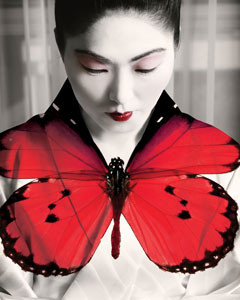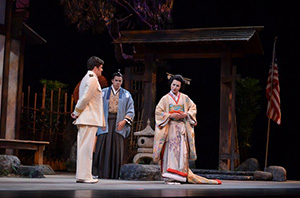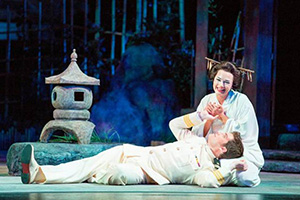
Whether the heart trumps the head, or the head trumps the heart, emotions are complicated business.
One wonders why the two most captivating tragic heroines in all of theater are under the age of 16: Juliet and Butterfly. Is it because they are as close to pure emotion as anyone can get and not old enough to be encumbered by rational thought? Both of them committing suicide by dagger is, I suspect, merely coincidental. But does make for good drama.
Is the drama about our unique ability to deceive ourselves for something we want so badly that we pay no attention to the abundant signs that we are not going to get it? Or is it about society heaping its misplaced values, layer upon layer, onto the individual heart, burying the emotions so deeply that the mind can only be awakened to those damaging values by a direct lightning strike to the forehead?
Or maybe it is simply about the artistic performance? Yep. Let’s go there.
First a short story published in a magazine, then a one act play produced in New York and London, then an opera premiering at La Scala, the subject of many films, a hit Broadway musical (Miss Saigon) and drama (M. Butterfly), Madame Butterfly continues to leave its mark on pop culture and captivates us while doing so.
Florida Grand Opera’s 74th season boasts an enticing mixed repertoire which began with Giacomo Puccini’s Madama Butterfly on Nov. 15.
At the turn of the 20th century, Luigi Illica and Giuseppe Giacosa supplied Puccini with an Italian libretto based on David Belasco's play adapted from John Luther Long’s largely factual short story Madame Butterfly.
The story is as complicated as it is simple: Set in Nagasaki (though it may as well be set Anywhere, planet Earth), a young geisha falls in love with a dashing and callous naval officer who wants her for his amusement. Butterfly is the pet name for the Japanese geisha Cio-Cio San and her love interest is American Lt. Benjamin Franklin Pinkerton.
This is so much more shattering than a clash of Eastern and Western cultures; it is the profound disconnect between true love and casual sex. Or perhaps the immaturity in the case of Pinkerton, where the devastation of someone else is the unintended consequence of his inability to recognize true love. To write Pinkerton off as a bad guy is too easy; to accept him as a tragic figure, in some ways as tragic as Butterfly, may be more to the point.
To step out of the real world and relay profound emotions at a specific time on a specific stage is the monumental challenge that any performer must face when they choose theater as their profession. It is more than voice, timing, and music, but rather some unknown substance that coils from the heart that causes the audience to believe or not believe the character. In short, when the audience is no longer watching a performance but feeling a real emotion.

Butterfly is a role that demands all of these qualities, plus plenty of stamina; she is on stage virtually the entire time. Soprano Kelly Kaduce meets that assignment confidently, passionately and loaded with talent to flesh out this multilayered character.
In her long duet with Pinkerton (tenor John Pickle) that closed Act I, the pretty and petite Kaduce exuded love much larger than her shyness, with a voice that was as delicate as it was powerful. She moved convincingly from tears (Bimba, Bimba, non piangere), after being denounced by her foreboding uncle, The Bonze (bass Jeffrey Beruan), to pleading with Pinkerton to "Love me, please" (Vogliatemi bene). Pickle radiated a mixture of bravado and tenderness during the love duet. Palpable chemistry served Kaduce and Pickle well as their voices rang true with flawless precision as he told her that he has caught his butterfly and she agreed.
Un bel dì vedremo is a tour de force in the entire soprano repertoire. Butterfly, after three years of waiting for Pinkerton’s return, sings of how, on one beautiful day, Pinkerton will arrive in the harbor and climb the hill to meet her. Kaduce was expansive with the aria, bringing it from subtle to full bloom with a bursting heart and voice that belied her small stature. Her money notes at the opera’s end were heartbreaking as she realized her deception and ruin and decided on hara-kiri with her father’s knife ("Who cannot live with honor must die with honor" - Con onor muore).
Kaduce also possessed fine acting chops. Especially compelling was a moment during the transitional music as she waited for Pinkerton’s return and was visibly overcome by a wave of doubt, and then struggled to compose herself. She went toe-to-toe with smarmy matchmaker Goro (tenor Daniel Bates) and the United States consul Sharpless (baritone Todd Thomas), fiercely declaring that she would rather die than return to a life as a geisha. She is certain Pinkerton will return once he learns of their young son.
Pickle, sporting a white naval officer’s uniform in the first act and dress blues in the final scene, made a convincing Pinkerton, though was a bit shy on power in his upper register when musing on how he wanted to have a girl in every port (Dovunque al mondo). He was more nuanced later, coming to grips with his impropriety (Addio, fiorito asil), hauntingly conveying his tortured realization of the pain he caused and now felt himself.
Todd Thomas, who was a riveting Scarpia in Tosca last season, cut a forceful and authoritative figure as Sharpless. His baritone was well drawn, playing his duty and concerns carefully, as he was the only one who saw the train wreck and was helpless to prevent it.
Mezzo-soprano Caitlin McKechney was a demure, sympathetic Suzuki (butterfly’s maid) and effectively conveyed the tragedy of Butterfly’s grievous situation, both in character and voice. She blended beautifully with Kaduce on The Flower Duet (Il cannone del porto! / Tutti i fior?), her facility wide with purity and impressive low notes.

Io so che sue dolore was a potent trio between Sharpless, Pinkerton and Suzuki where all three pleaded their case – Sharpless repeating his warning, Pinkerton realizing the enormity of the grief he has wrought, and Suzuki overloaded with anxiety having to tell Butterfly of Pinkerton’s intention. Pickle, Thomas and McKechney combined well with more than enough emotion to sell this glorious trio.
Wispy and beguiling four-year-old Sebastian Powell was the fine little actor playing Butterfly’s child, Sorrow.
Of course, one other noteworthy character was Puccini himself. His musical gifts are abundant. He wrote in the verismo style (depicting real life characters in contrast to the Romantic conventions that dominated opera of the prior century). His score was cinematic in scope, somehow leaping over the era of the silent film and more reminiscent of the underscoring’s of films from the '30s and '40s.
Conductor Ramón Tebar and the FGO orchestra deftly handled Puccini’s score – be it the busy opening counterpoint that launched the dramatic action, the Japanese element, the seamless quoting of “The Star-Spangled Banner” suggestive of Pinkerton, passages accurately conveying Butterfly’s denial and her yearning, the nifty underscoring of Pinkerton’s cowardice with music that hinted at romance, Butterfly descending to death as the strings descended, and the final chord shutting the door.
The wordless Coro a bocca chiusa was strong in its simplicity. The offstage humming chorus and lighting vividly painted the passage of time during Butterfly’s vigil as she waited patiently from sundown to sunrise for Pinkerton. Kenneth Yunker’s transitional lighting from evening to morning light was dramatic, perhaps paying homage to David Belasco who was first to use electric lighting in his Broadway Theater and famous for creating this effect during his production.
Marc Astafan was authentic in his stage direction, adding a verismo touch as Pinkerton lit up a cigarette while waiting for Butterfly to prepare for their wedding night.
Justin Moss, Director of FGO Broward Operations & Outreach, observed in his lively pre performance remarks that the set was a classic Japanese house with a green-glazed tile roof and sliding screen walls that dominated the stage. The costumes, originally designed by Allen Charles Klein for FGO in the 1980s, were remarkably authentic, detailed and fresh looking.
Additional cast:
Cio-Cio-San, alternating soprano Vanessa Isiguen; Lt. B. F. Pinkerton, alternating tenor Martin Nusspaumer; Prince Yamadori, tenor Will Hughes; The Imperial Commissioner, bass Chance Eakin; Kate Pinkerton, mezzo-soprano Hailey Clark; The Official Registrar, bass Isaac Bray; Yakuside, bass Miguel Angel Llerena; Cio-Cio San's mother, mezzo-soprano Heather Cecilia McLeod; The aunt, soprano Emilia Acon; The cousin, soprano CJ Baik.
Production team:
Conductor Ramón Tebar, Director Marc Astafan, Set Designer David P. Gordon, Lighting Designer Kenneth Yunker, Costume Designer Allen Charles Klein, Wig and Makeup Designer Sue Schaefer, Chorus Master Michael Sakir, Production Stage Manager Liam Roche, Supertitle Operator Karla Gutierrez.
Sung in Italian with projected titles in English and Spanish
Miami - Adrienne Arsht Center for the Performing Arts / Ziff Ballet Opera House
November 21, 22, 2014
Fort Lauderdale - Broward Center for the Performing Arts / Au-Rene Theater
December 4, 6, 2014
 MAIN MENU
MAIN MENU

